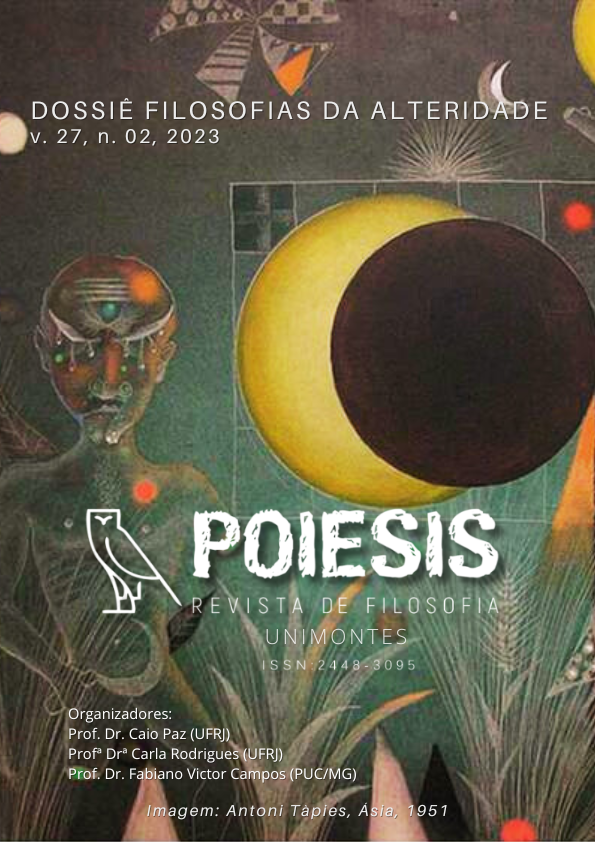THE SELF AND THE OTHER: THE INTERSUBJECTIVE RELATIONSHIP IN EMMANUEL LÉVINAS
DOI:
10.46551/2448-30952023v27n206Keywords:
Lévinas, Intersubjectivity, Other, Responsibility, OthernessAbstract
Emmanuel Lévinas is part of a select group of philosophers who, throughout the 20th century, emerged as promoters of a philosophy of otherness. in accordance with such noble consideration, this article aims to uncover how the Lithuanian understands the intersubjective relationships. Therefore, we will analyze the logic of representation and ontological totality in order to demonstrate that such conceptions reduce, instrumentalize and subjugate the Other and differences. Next, we will show how Lévinas, using categories such as Infinity, Metaphysics, Desire, Face, Responsibility, understands the intersubjective relationship, so that the Self is responsible for the Other and promotes differences. Through these concepts, the author will attest that in the Self-Other relationship, this cannot be an alter-ego that, as in a mirror, reflects the image of the Same, but it rather absolute alterity, inadequate to the totalizing structures. This encounter is essentially ethical and
animated by a movement of openness and transcendence called Metaphysical Desire, which leads to a face-to-face relationship with the Face of the Other. Within this philosophy, the Face of the different presents itself as a regulator of life and not as something to be overcome or placed in a subordinate position. The possibility of looking and seeing him is hearing: You will not kill! Killing, in Lévinas, is eliminating the cognitive capacity, the right to be, to demand, to manifest oneself in the world that the Other owns. Killing is eliminating the existence of the Other, as the Lithuanian himself witnessed during the War. Therefore, the Self that was once closed in solipsism and saw the Other as an enemy, in Levinasian thought, opens up and is responsible for it. That’s exactly what this present article will discuss, with the intention of explaining, even if in a basic and introductory way, aware of the scope and depth of the philosopher's work, Levinas's contribution to thinking about the intersubjective relationship.
Downloads
References
ALMEIDA, Rodrigo Ramos de. A ética como filosofia primeira: uma introdução à filosofia de Emmanuel Lévinas. Revista Digital FAPAM, Pará de Minas, v. 4, n. 04, p. 01-27, abr. 2013. Disponível em <https://periodicos.fapam.edu.br/index.php/synthesis/article/view/58/54>. Acesso em: 16 dez. 2020.
CHACON, Daniel Ribeiro de Almeida. Rosto e Responsabilidade na Filosofia da Alteridade em Emmanuel Lévinas. Intuitio, Porto alegre, v. 8, n.2, p. 15-24, Dez. 2015. Disponível em: <http://revistaseletronicas.pucrs.br/index.php/intuitio/article/view/19599/14185>. Acesso em: 12 fev. 2021.
COSTA, Márcio Luis. Lévinas: uma introdução. Petrópolis: Vozes, 2000.
COUTINHO, Adriana Maria Ferreira. Educar depois de Lévinas: para uma pedagogia do Rosto. 2008. 123 f. Dissertação (Mestrado em Educação)-Universidade Federal de Pernambuco, Recife, 2008. Disponível em: <https://repositorio.ufpe.br/handle/123456789/4328>. Acesso em: 15 set. 2021.
DESCARTES, René. Meditações metafísicas. Tradução Edson Bini. São Paulo: Edipro, 2016.
FERREIRA JUNIOR, Márcio José; SILVA, Antônio Carlos Trindade da. Lévinas e a precedência ética. RHEMA, Juiz de Fora, v. 16, n. 52, p. 69-82, ago./dez. 2018. Disponível em: . Acesso em: 15 abr. 2021.
GALLO, Sílvio. Eu, o outro e tantos outros: educação, alteridade e filosofia da diferença. In: GARCIA, Regina Leite (Org.). Diálogos cotidianos. Petrópolis: DP et alii, 2010. p. 231-246.
_____. “Imagens do outro na Filosofia: o desafio da diferença”. Educação temática digital, São Paulo, v. 14, n. 1, p. 160-178. 2012. Disponível em: <https://www.researchgate.net/publication/320206310_Imagens_do_outro_na_filosofia_o_desafio_da_diferenca>. Acesso em: 22 out. 2020.
GOMES, Carla Silene Cardoso Lisbôa Bernardo. Lévinas e o outro: a ética da alteridade como fundamento da justiça. 2008. 90 f. Dissertação (Mestrado em Direito)–Pontifícia Universidade Católica do Rio de Janeiro, Rio de Janeiro, 2008. Disponível em: <http://www.dominiopublico.gov.br/download/teste/arqs/cp113166.pdf>. Acesso em: 04 fev. 2021.
HUTCHENS, Benjamin. Compreender Lévinas. Tradução Vera Lúcia Joscelyne. Petrópolis: Vozes, 2007.
Downloads
Published
How to Cite
Issue
Section
License
Copyright (c) 2024 Revista Poiesis

This work is licensed under a Creative Commons Attribution-NonCommercial-NoDerivatives 4.0 International License.





.png)

